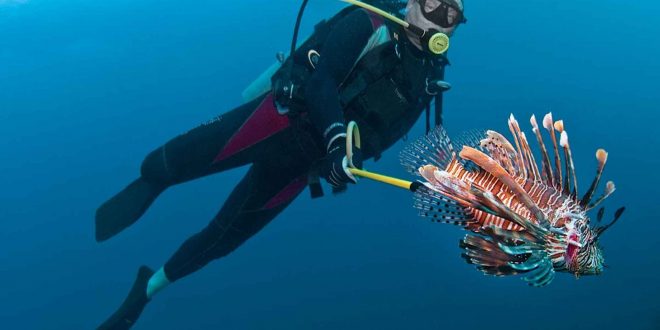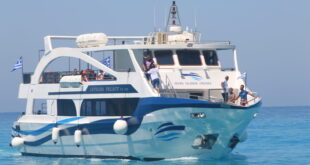A new invader to Zakynthos seems to have invaded our waters. However, if handled correctly, it makes a great meal at the dinner table.
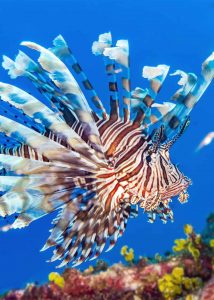
The Pterois Miles known as its scientific genus. Otherwise known as the common Lionfish or devil firefish, is a venomous marine fish. Native to the Indo-Pacific areas. The scientific name is from Greek origin pteron, meaning “wing” and Latin miles meaning “soldier”.
Characteristics.
It’s characteristics are that the colour of these fish my vary from reddish to tan or grey. They have a numerous thin, dark, vertical bars on their heads and bodies. They usually grow up to 35 cm in length. The dorsal fin has 13 long, strong spines and 9-11 soft rays. The anal fin has three long spikes and six or seven soft rays. It appears feathery and the pectoral fins are like wings with separate broad smooth rays.
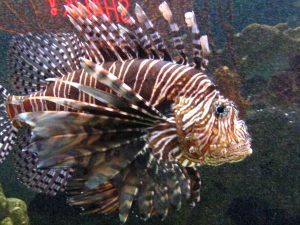
It is mainly nocturnal and may hide in crevices during the day. Feeding on fish and small crustaceans. It has few predators, thus causing concern. Moray eels, recently identified as natural predators of the common lionfish in its native habitat in the Red Sea.
Invasion problem
Multiple fisheries have confirmed its invasion, along with divers and swimmers. Areas such as Laganas Bay, Agios Nikolaos Volimes and Xigia. In fact, the National Marine Park of Zakynthos, in cooperation with the Port Authority and the Veterinary Directorate of the Zakynthos Regional Unit, sampled the species in the previous period.
Click on for Video:- Lionfish Zakynthos
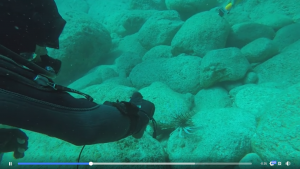
Local Diver’s experience.
Zakynthos Informer spoke with Mike Gallatley, an experienced diver from the Turtle Beach Dive Centre in Keri.
” Well I’ve dived here for the last 18 years now and this is the first year I’ve seen or heard of them being here in our waters. They’re making their way through the Suez Canal from the Red Sea. They have 18 poisonous spines on them that look frilly and soft but can sting very badly. Not fatal but much pain. They are a predatory fish and multiple very quickly. They hunt mainly at night and when in bigger numbers they hunt in packs like lions.
At the moment they are in shallow water around Keri caves area, usually at a depth of 8 to 10 metres. They prefer warmer waters but are acclimatizing to our colder waters. Cyprus has a big problem with them and kill them when possible. I believe they are very tasty but had yet to try one. I think it will be a few years yet before they are a big problem here. Time will tell. “
Dangers.
Just recent to the Ionian Sea, the dangers posed to humans due to the presence of poisonous spines on its wings. Its extensive expansion into the Mediterranean waters is also a threat to the indigenous fish populations in the marine ecosystems to which this fish invades. Given its recent appearance in the Mediterranean, many other species of fish do not recognize it as a predator. Thus making it easy to prey on the biological invader. Also, Lionfish can and easily adapt to a variety of habitats with very few natural predators. These predators also belong to Epinephelus marginatus or grouper. Its systematic overfishing – which has been observed in recent years in Greek Seas – intensifies the spread of Lionfish. Therefore, the need to protect the Grouper becomes even greater. It seems that the species of this family are the only natural predators that can limit the growth of the Lionfish population.
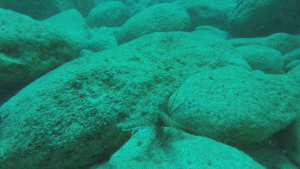
A delicacy.
Despite its danger to humans, in the event of contact with the fish, the Lionfish is edible. Apparently quite tasty too. The fish must not be handled with bare hands. Once the poisonous spines are removed it is completely safe to eat (it is the exact opposite of another recently introduced marine invader, the Lagocephalus sceleratus (PufferFish). Eating this fish will only have bad consequences due to its poisonous toxins.
You can help fight the invasion!
It is important to note! The Management Body of the Marine Park of Zakynthos in an effort to reduce its possible spreading around Zakynthos, is seeking help.
It needs to be informed of incidents, where its location was and when. In addition, a special Registration Form where Citizens can fill in information about a person’s location can be found on the Marine Park’s Website National Marine Park of Zakynthos Contact form. The information provided by Citizens-Scientists will make a crucial contribution to the integrated monitoring of its population status and distribution. Thus add measures to the appropriate management and to limit its spread.
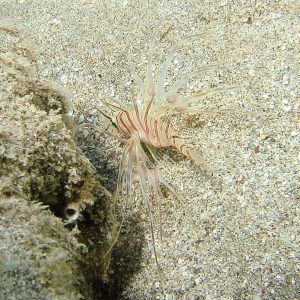
Zakynthos Informer has also been speaking with the organisation MER (Marine Environment Research) centre. MER conducts research, environmental monitoring, impact assessments and offer high quality and flexible consultation services for marine environments. They too, are aware of our problem. Mentioning that sights need to be recorded and that a link below makes it easy for those who do sight the invader. IUNC- MedMIS App LionFish portal.
What happens if you get stung?
Below is some great advice by Lionfishinfo.
First step, don’t panic! No one has ever died from a lionfish sting. You’ve got a few minutes before the pain really starts to kick in. A lot of what comes next depends on how many spines stuck in you. How deep they went is also another and how much venom was injected. If you were underwater for the sting, notify your dive buddy, abort your dive and start heading up. Don’t skip your safety stop, there is a lot more risk from decompression sickness than from a lionfish sting. Most stings are to the hands and swelling will be unavoidable! So remove any jewlery you may have. Some people feel that you can ‘milk’ the venom out by squeezing the flesh around the injection site to force the venom out. First, you want to remove any piece of spine or debris that may be in the wound site. Clean and disinfect the wound if able. Stop any bleeding if present.

Heat is the main thing.
Heat is the single best thing you can do for a lionfish sting.
Soak the wound for at least 30 minutes in heated, non-scalding water as soon as possible. The lionfish venom is protein based and is neutralized by the hot water thus preventing the protein from moving into the blood stream. The hot water is also very effective at controlling the pain. Even though you will probably start to see swelling of the injured area, DO NOT APPLY ICE! Use a heat pack, or hot water from the boats exhaust. Some divers carry a thermos of hot water when planning to hunt lionfish for just this reason. If not close to medical care, you can take BENADRYL (antihistamine) and IBUPROFEN (Motrin or Advil) and inflammatory. Medication will not only reduce the pain but even more importantly it will reduce the swelling that can cause even more damage to the affected area by causing pressure in the arteries, veins, and lymph ducts.
It’s important to monitor for shock and to seek proper medical attention as soon as possible.
There are many other complications that can arise from any marine creature envenomation such as shortness of breath, weakness, fainting, and cardiac arrest due to shock from the extreme pain. There is always a chance of infection, so proper cleaning and care of the wound is critical. Lionfish venom can cause tissue necrosis that has the ability to spread if not properly treated as soon as it is noticed.
for more information click on source:- https://lionfish.info/lionfish-sting-first-aid/
 Zakynthos Informer Zakynthos Informer
Zakynthos Informer Zakynthos Informer

